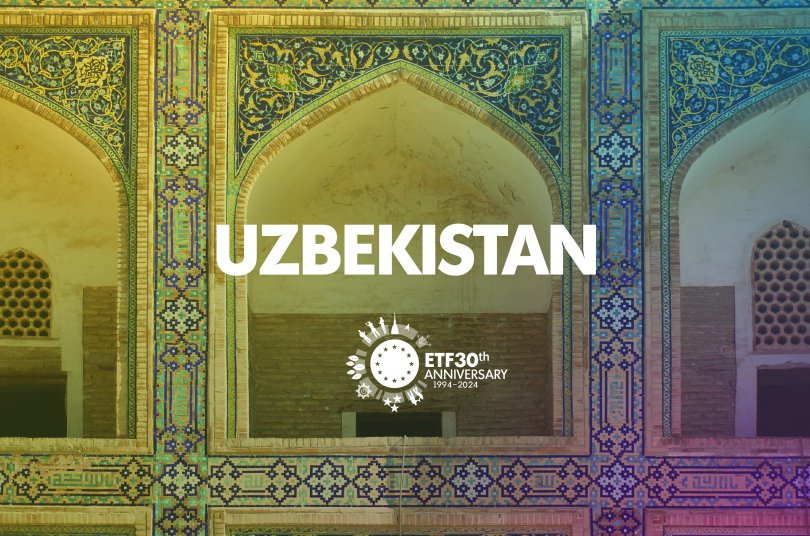
30 years, 30+ stories: Uzbekistan focuses on regional cooperation and hosts high-level meeting
In December 2024, Tashkent hosted a key event for Central Asia's education and skills development agenda. On 4-5 December, the European Training Foundation (ETF) organised the Second High-Level Group meeting with vice-ministers of education and labour from Central Asian countries as part of the EU-funded Dialogue and Action for Resourceful Youth in Central Asia (DARYA) project.
The meeting focused on sustainable cooperation for skills development and youth employability. It aimed to strengthen partnerships and explore the systematic integration of green transition elements into skills development reforms. The event also provided critical guidance on DARYA's role in strengthening regional cooperation for 2025-2027 period. By focusing on sustainability, accessibility and relevance, the initiative aims to raise the standards of education, training and employment systems across the region, benefiting its most valuable resource: its youth.
'Uzbekistan is always happy to welcome guests, especially from Europe, as it opens doors for learning, dialogue and joint progress,' says Utkir Alijonov, Head of the Department for Coordination and Organisation of the Technical Vocational Education and Training Process at the Ministry of Higher and Secondary Specialised Education.
He stresses the importance of the upcoming meeting, describing it as 'a key platform for regional and European stakeholders to come together and discuss strategies for long-term cooperation.' Alijonov notes Uzbekistan's 'long-standing and close partnership with the ETF,' which he describes as 'a bridge for partnerships, connecting Uzbekistan with European expertise in education and training.'
Since 1995, the ETF has been helping Uzbekistan build its education and training systems to improve employability, widen access to opportunities and promote social cohesion. Between 2014 and 2020, the ETF worked with the EU Delegation to implement the Skills Development for Employability in Rural Areas of Uzbekistan project, implemented by UNESCO through EU funds. Through initiatives such as the Torino Process, the ETF has helped Uzbekistan align vocational education and training (VET) systems with strategic policy goals and promote cooperation between education and business.
Eva Jansova, human capital development expert and country liaison for Uzbekistan at the ETF, reflects on the impact. 'Uzbekistan shows us an impressive drive for progress, innovation and regional leadership. The energy and ambition here is remarkable and we are committed to supporting their journey to learn from international best practices.'
Uzbekistan's reforms in vocational education and lifelong learning have gained momentum since 2017, culminating in the 2020 Law on the Recognition of Lifelong Learning. Alijonov emphasises the priority given to dual education, a German-inspired model that combines theoretical learning with practical experience.
'Uzbekistan now has a legal framework for dual education, with 50% of colleges implementing this model in at least one curriculum,' Alijonov explains. He also highlights the focus on the Double Degree programmes, which offers young people internationally recognised qualifications while preparing them for the domestic and global labour markets.
In 2022, DARYA became the EU's first regional project to promote the skills development and integration of Central Asian youth. In Uzbekistan, the programme addresses key priorities such as tracking VET graduates and promoting the advancement of a National Qualifications Framework (NQF).
'The development of the NQF is a crucial step for Uzbekistan's education reforms,' notes Jansova. 'It ensures alignment between education systems and labour market needs, while promoting mobility and transparency.' Alijonov agrees, adding, 'We have been studying European experience on NQFs, and the ETF's expertise in this area is indispensable for us.'
An outstanding initiative under DARYA in Uzbekistan is SCAFFOLD, a modular tool to support educators in designing and implementing effective learning activities. Jansova praises the strong commitment of the Ministry, which co-finances the initiative, provides premises and supports teachers' travel for training. Alijonov comments, 'Without teachers, no development or reform can succeed. The Ministry's commitment to SCAFFOLD reflects the enthusiasm of educators to embrace innovative tools for learning.'
Uzbekistan sees education not only as a national priority, but also as a regional opportunity. Alijonov articulates his vision. 'In Central Asia, we seek convergence in education. Respecting our common history and challenges, we are working on skills and qualifications frameworks that will bring us closer together. This won't happen overnight, but Uzbekistan is ready to take steps to facilitate this process.'
As the DARYA initiative progresses, Alijonov also expresses Uzbekistan's interest in participating in other ETF programmes, including on green skills and labour migration. He emphasises, 'Education is at the heart of all our reforms. By learning from the ETF's experience, Uzbekistan's education system will become more in line with global standards and closer to the ETF's vision of lifelong learning and sustainable development.'
The meetings in Tashkent represent not only an exchange of ideas, but also a reaffirmation of a shared commitment to regional and global cooperation. As Uzbekistan builds momentum in its education reforms, its strong partnership with the ETF and regional allies promises a brighter, more connected future for its youth and beyond.
Did you like this article? If you would like to be notified when new content like this is published, subscribe to receive our email alerts.